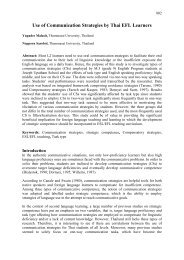The Effects of Semantic Mapping on Vocabulary Memorizing
The Effects of Semantic Mapping on Vocabulary Memorizing
The Effects of Semantic Mapping on Vocabulary Memorizing
You also want an ePaper? Increase the reach of your titles
YUMPU automatically turns print PDFs into web optimized ePapers that Google loves.
Besides, vocabulary is broadly defined as knowledge <str<strong>on</strong>g>of</str<strong>on</strong>g> words and word meanings (Lehr et al.,<br />
2004). According to Lehr and his colleagues, vocabulary is more complex than this definiti<strong>on</strong><br />
suggests. First, words come not <strong>on</strong>ly in oral forms including those words that can be recognized<br />
and used in listening and speaking but also in print forms to be recognized and used in reading<br />
and writing. Sec<strong>on</strong>d, word knowledge also comes in two forms: receptive and productive.<br />
Receptive vocabulary is words that can be recognized in reading and listening. Productive<br />
vocabulary refers to words that can be used in speaking and writing (Lehr et. al., 2004).<br />
<str<strong>on</strong>g>The</str<strong>on</strong>g>refore, vocabulary is understood as knowledge <str<strong>on</strong>g>of</str<strong>on</strong>g> word spelling, pr<strong>on</strong>unciati<strong>on</strong>, collocati<strong>on</strong>s<br />
(i.e. words it co-occurs with), and appropriateness (Nati<strong>on</strong>, 1990). However, Pyles (1970)<br />
c<strong>on</strong>firmed that vocabulary is the focus <str<strong>on</strong>g>of</str<strong>on</strong>g> language with its sounds and meaning, which interlock<br />
to allow us to communicate with <strong>on</strong>e another.<br />
As discussed above, vocabulary can be seen in many different ways. <strong>Vocabulary</strong> refers to words<br />
or a set <str<strong>on</strong>g>of</str<strong>on</strong>g> words in a language or knowledge <str<strong>on</strong>g>of</str<strong>on</strong>g> words regarding its forms, meanings and how to<br />
use it accurately in the c<strong>on</strong>text. In the present study, vocabulary refers to the words, compounds<br />
and idioms in a language that can be used to c<strong>on</strong>veyed and received informati<strong>on</strong> in oral and<br />
written communicati<strong>on</strong>.<br />
1.2. <str<strong>on</strong>g>The</str<strong>on</strong>g> importance <str<strong>on</strong>g>of</str<strong>on</strong>g> vocabulary<br />
Regarding the importance <str<strong>on</strong>g>of</str<strong>on</strong>g> vocabulary, Krashen (1989) pointed out that “a large vocabulary is,<br />
<str<strong>on</strong>g>of</str<strong>on</strong>g> course, essential for mastery <str<strong>on</strong>g>of</str<strong>on</strong>g> a language” as “without vocabulary, nothing can be c<strong>on</strong>veyed”<br />
(Wilkins, 1972).<br />
Rubin and Thomps<strong>on</strong> (1994) c<strong>on</strong>sidered the significant role <str<strong>on</strong>g>of</str<strong>on</strong>g> vocabulary in communicati<strong>on</strong> as<br />
stating that “<strong>on</strong>e cannot speak, understand, read or write a foreign language without knowing a<br />
lot <str<strong>on</strong>g>of</str<strong>on</strong>g> words. <strong>Vocabulary</strong> learning is at the heart <str<strong>on</strong>g>of</str<strong>on</strong>g> mastering a foreign language”. Nguyen and<br />
Khuat (2003) also accepted that vocabulary knowledge plays an important role in learning a<br />
foreign language. <strong>Vocabulary</strong> is <strong>on</strong>e element that links the four skills <str<strong>on</strong>g>of</str<strong>on</strong>g> speaking, listening,<br />
reading and writing all together. <strong>Vocabulary</strong> is a core comp<strong>on</strong>ent <str<strong>on</strong>g>of</str<strong>on</strong>g> language pr<str<strong>on</strong>g>of</str<strong>on</strong>g>iciency and<br />
provides much <str<strong>on</strong>g>of</str<strong>on</strong>g> the basis for how well learners listen, speak, read, and write (Richards and<br />
Renandya, 2002).<br />
In fact, vocabulary is a means to support communicati<strong>on</strong>. It is a necessary comp<strong>on</strong>ent <str<strong>on</strong>g>of</str<strong>on</strong>g><br />
language instructi<strong>on</strong>. In order to communicate well in a foreign language, learners should acquire<br />
an adequate numbers <str<strong>on</strong>g>of</str<strong>on</strong>g> words and should know how to use them accurately. When emphasizing<br />
the importance <str<strong>on</strong>g>of</str<strong>on</strong>g> vocabulary in communicati<strong>on</strong>, Della and Hocking (1992) also claimed that<br />
with a little grammar, the learners can have a little smooth communicati<strong>on</strong>, but without<br />
vocabulary, it is difficult for others to understand the informati<strong>on</strong> the learners want to express.<br />
For this reas<strong>on</strong>, a lack <str<strong>on</strong>g>of</str<strong>on</strong>g> good grammatical structures may not interrupt communicati<strong>on</strong>.<br />
However, if we lack vocabulary, there is no successful communicati<strong>on</strong>. With a good knowledge<br />
<str<strong>on</strong>g>of</str<strong>on</strong>g> vocabulary, learners may feel c<strong>on</strong>fident in communicati<strong>on</strong>, and it c<strong>on</strong>tributes to the success in<br />
communicati<strong>on</strong>. However, the questi<strong>on</strong> to arise is which words are necessary for learners to<br />
know and how to remember these words.<br />
630






